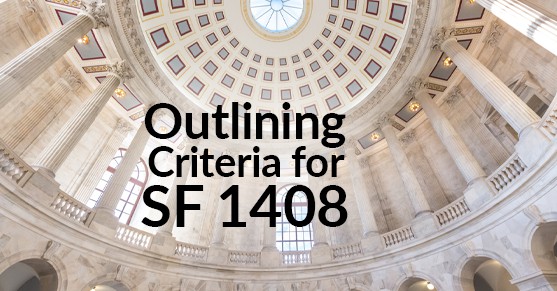Accounting system standards seem to always bubble up in conversation with government contractors. Whether we’re talking about meeting agency regulations, audits, or discussing timekeeping best practices, accounting is at the heart of every government contractor’s success. It’s also at the heart of a lot of confusion, especially for new government contractors.
For many of clients that are new to the industry, we often get questions revolving around an important pre-award survey, Standard Form (SF) 1408. “What is an SF 1408?” “Is it an audit?” “What is the DCAA looking for?” We’d like to address these questions and offer some vital knowledge for approaching pre-award surveys like SF 1408.
What is SF 1408?
For any new government contractor — or contractors without experience in cost-reimbursement contracts — with a potential contract in the works, the SF 1408 will more than likely be their first interaction with the DCAA. As a pre-award survey, SF 1408 is used to evaluate a contractor’s accounting system and confirm that it’s an acceptable, DCAA-conforming system for cost accumulation. It’s important to understand that an SF 1408 is not an audit, though many new organizations suspect this. On the contrary, SF 1408 is a helpful tool that gives your contract administration office a view into your accounting system to gauge whether you’re prepared to undertake specific projects.
The main point is to demonstrate that your business’s accounting system is up to standards and can handle the demands of a contract, even if you haven’t necessarily used the system before. When a contract is on the horizon for new contractors, the DCAA needs to know they can follow through with the type of cost information the contract requires.
Essential Criteria for SF 1408 Completion
No two accounting systems are the same, which is why pre-award surveys are vital for assuring federal agencies that the accounting systems of their prospective partner meet the following criteria.
1) Timekeeping Systems
At GovCon365, we talk a lot about timekeeping. As we’ve said before, “timekeeping has the biggest potential for fraud — sometimes costing companies up to $18.5 million,” which is why surveying new timekeeping systems is an integral part of SF 1408.
The timekeeping system you employ needs to easily track the hours of employees and link those hours to their respective projects. There are many discrepancies within this process; the cost objective generally aligns with whatever contract employees are clocking in; however, there are also R&D developments, indirect charges, bid/proposal efforts, and so on. Thus, an SF 1408 will help guarantee your system can allocate hours among appropriate projects.
2) Transaction Controls
As we mentioned above, whether or not you’ve used your system before, you need to have transaction controls available before “direct charging of indirect expenses and vice versa.” What we recommend to new government contractors is to create an outline of their expense transactions to gain a clear vision of purchase orders, transactions, receiving documents, vendor invoices (whenever you receive them), and so forth.
3) Cost Groupings
Making sure indirect costs are accurately gathered in appropriate groupings is as helpful to your business as they are to passing the SF 1408 survey. Additionally, the DCAA suggests that organizations document the logistics of said groupings, as well as displaying up-to-date balances.
4) Cost Ledger
No accounting system would be complete without an operational ledger that provides actual costs of the looming contract; with an SF 1408, it’s a mandatory requirement. Meeting the direct cost requirement means having a ledger that includes the preceding expenses of the project, as well as the cost accumulated throughout the project/task order.
Although those four criteria are essential parts of the pre-award survey, there are several other aspects of your accounting system to keep in mind, including cost segregations, limitations on funding, labor distribution, progress billing, and more. For the most part, your contract administration office will help your organization navigate an SF 1408. However, if you’re looking for additional assistance with building your accounting system, feel free to reach out in the comments below or contact us here. GovCon365 has helped numerous government contractors build fully operational accounting systems that exceed the expectations of the DCAA, and we’d love to help you!

